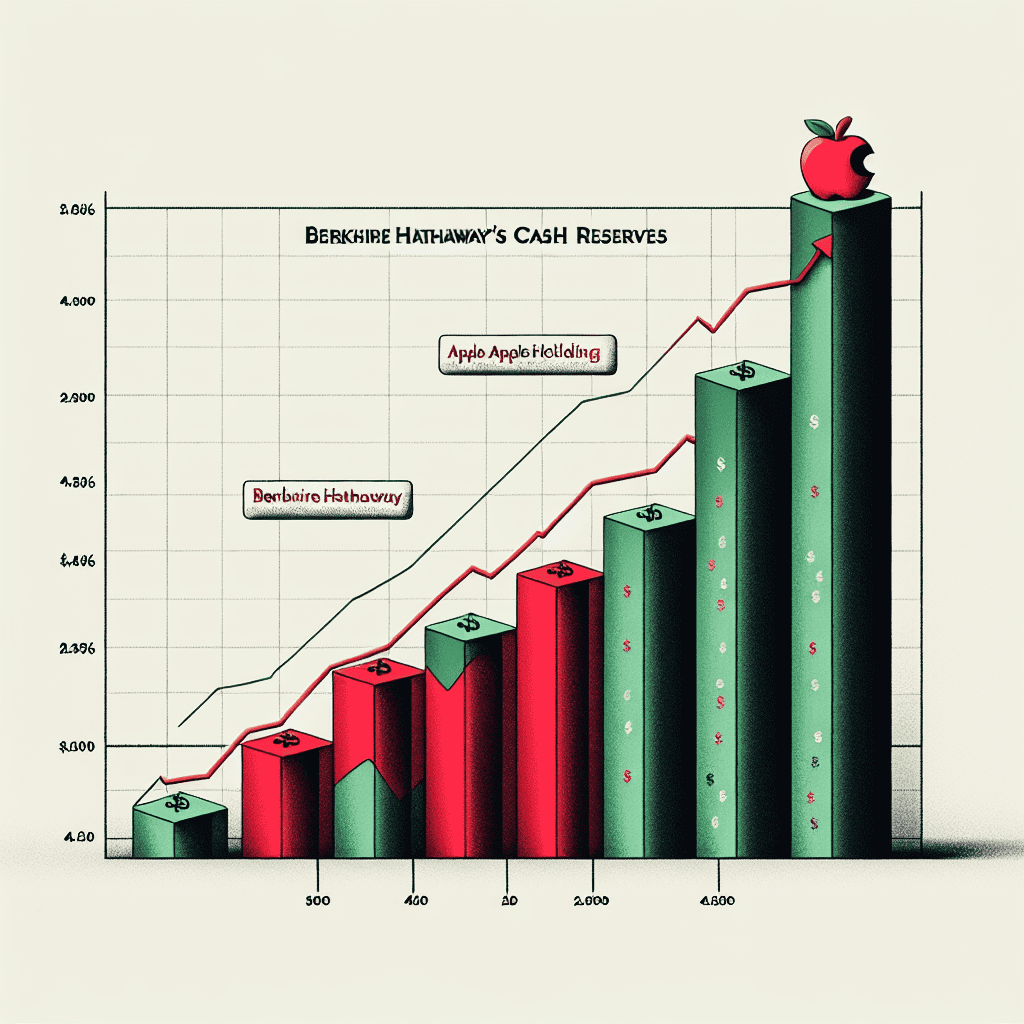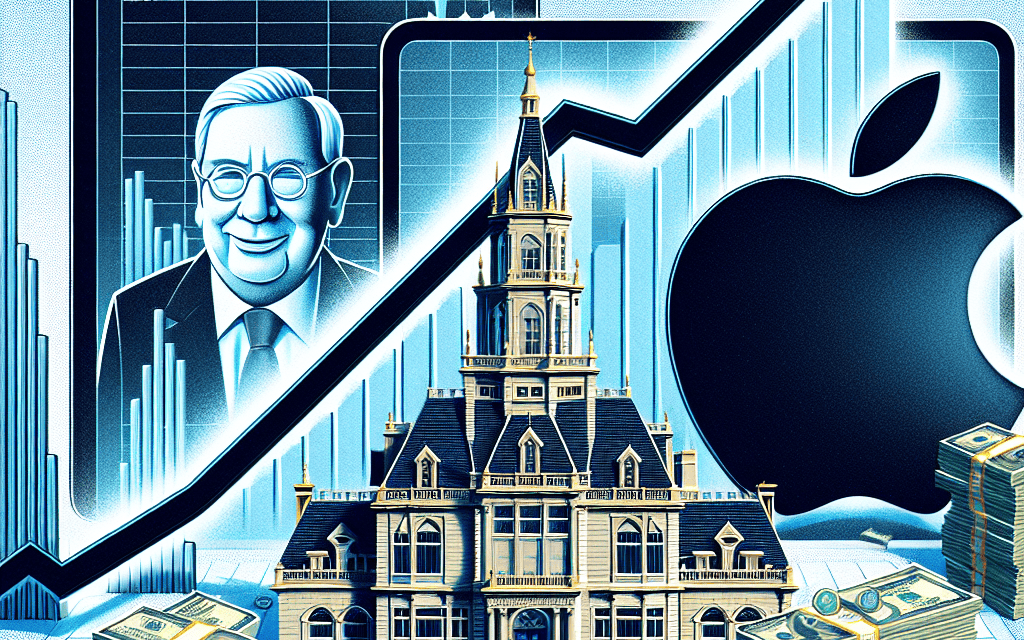“Strategic Shift: Berkshire Hathaway Trims Apple Stake, Bolsters Cash Fortress to Record Levels”
Introduction
Berkshire Hathaway, the multinational conglomerate led by renowned investor Warren Buffett, has recently made significant adjustments to its investment portfolio, notably reducing its holdings in Apple Inc. This strategic move comes as the company simultaneously boosts its cash reserves to unprecedented levels. The decision to trim its stake in Apple, a cornerstone of Berkshire’s equity investments, marks a notable shift in the conglomerate’s investment strategy, reflecting a cautious approach amid uncertain economic conditions. By increasing its cash reserves, Berkshire Hathaway positions itself to capitalize on future investment opportunities, maintaining its reputation for financial prudence and strategic foresight.
Impact Of Berkshire Hathaway’s Apple Holdings Reduction On The Stock Market
Berkshire Hathaway’s recent decision to reduce its holdings in Apple has sent ripples through the stock market, prompting investors and analysts to reassess their positions and strategies. As one of the most influential investment firms globally, Berkshire Hathaway’s moves are closely watched, and its decision to trim its Apple stake has sparked considerable discussion about the potential implications for both the company and the broader market. This strategic shift comes at a time when Berkshire Hathaway has also increased its cash reserves to an all-time high, signaling a cautious approach amid uncertain economic conditions.
Apple, a cornerstone of Berkshire Hathaway’s portfolio, has long been a significant contributor to the firm’s success. The tech giant’s consistent performance and innovative prowess have made it a favorite among investors, and Berkshire’s substantial investment in Apple has been a testament to its confidence in the company’s long-term prospects. However, the recent reduction in holdings suggests a reevaluation of this stance, possibly driven by a desire to capitalize on gains or mitigate risk in a volatile market environment.
The impact of this decision on the stock market is multifaceted. On one hand, Berkshire Hathaway’s move could be perceived as a signal that Apple may face challenges ahead, prompting some investors to reconsider their positions. This perception could lead to increased volatility in Apple’s stock price as market participants react to the news. On the other hand, the reduction in holdings might also be viewed as a routine portfolio adjustment, reflecting Berkshire’s strategy to diversify its investments and maintain a balanced approach.
Moreover, the increase in Berkshire Hathaway’s cash reserves to unprecedented levels underscores a broader trend of caution among major investors. In an era marked by economic uncertainty, geopolitical tensions, and fluctuating interest rates, holding substantial cash reserves provides flexibility and security. This strategy allows Berkshire Hathaway to seize opportunities as they arise, whether through strategic acquisitions or investments in undervalued assets. Consequently, the firm’s decision to bolster its cash position may be interpreted as a prudent measure to navigate potential market turbulence.
In addition to its immediate effects on Apple and the stock market, Berkshire Hathaway’s actions may also influence other investors and institutions. As a bellwether for investment strategies, Berkshire’s moves often set a precedent, encouraging others to adopt similar approaches. This ripple effect could lead to a broader trend of increased cash holdings and portfolio diversification across the investment landscape, as market participants seek to emulate Berkshire’s cautious yet opportunistic stance.
Furthermore, the reduction in Apple holdings and the accumulation of cash reserves may prompt discussions about the future direction of Berkshire Hathaway’s investment strategy. With a substantial war chest at its disposal, the firm is well-positioned to explore new opportunities and adapt to changing market conditions. This flexibility could lead to strategic investments in emerging sectors or innovative technologies, potentially reshaping the firm’s portfolio and influencing market dynamics.
In conclusion, Berkshire Hathaway’s decision to reduce its Apple holdings and increase its cash reserves has significant implications for the stock market. While it may signal caution regarding Apple’s future prospects, it also reflects a broader strategy of risk management and preparedness in uncertain times. As investors and analysts continue to assess the impact of these moves, the actions of Berkshire Hathaway serve as a reminder of the importance of adaptability and foresight in navigating the complexities of the financial landscape.
Reasons Behind Berkshire Hathaway’s Decision To Increase Cash Reserves
Berkshire Hathaway’s recent decision to reduce its holdings in Apple and increase its cash reserves to an all-time high has sparked considerable interest and speculation among investors and market analysts. This strategic move, orchestrated under the guidance of Warren Buffett, a stalwart in the investment world, reflects a nuanced approach to navigating the current economic landscape. Understanding the rationale behind this decision requires a closer examination of several interrelated factors that have influenced Berkshire Hathaway’s investment strategy.
To begin with, the reduction in Apple holdings, while significant, does not indicate a lack of confidence in the tech giant. Apple has long been a cornerstone of Berkshire Hathaway’s portfolio, contributing substantially to its overall value. However, the decision to trim its position in Apple can be seen as a prudent measure to diversify risk and reallocate resources. In an era where technology stocks have experienced unprecedented growth, there is an inherent risk of overexposure. By reducing its stake, Berkshire Hathaway is effectively managing its portfolio’s risk profile, ensuring that it remains balanced and resilient against potential market volatility.
Moreover, the decision to bolster cash reserves aligns with Berkshire Hathaway’s long-standing investment philosophy of maintaining liquidity to capitalize on future opportunities. In times of economic uncertainty, having substantial cash reserves provides a strategic advantage, allowing the company to act swiftly and decisively when attractive investment opportunities arise. This approach is particularly relevant in the current economic climate, characterized by geopolitical tensions, fluctuating interest rates, and concerns over inflation. By increasing its cash reserves, Berkshire Hathaway positions itself to navigate these challenges with greater flexibility and confidence.
Additionally, the move to increase cash reserves can be interpreted as a response to the broader macroeconomic environment. With central banks around the world adopting varying monetary policies, the investment landscape is becoming increasingly complex. In such a scenario, holding cash offers a hedge against potential market downturns and provides a buffer against unforeseen economic shocks. This conservative approach underscores Berkshire Hathaway’s commitment to safeguarding its capital while remaining poised to seize opportunities that align with its long-term investment objectives.
Furthermore, the decision reflects a strategic shift towards a more cautious investment stance. As valuations in certain sectors reach unprecedented levels, the potential for market corrections looms large. By maintaining a robust cash position, Berkshire Hathaway is effectively insulating itself from the adverse effects of market fluctuations. This strategy not only preserves capital but also enhances the company’s ability to deploy resources strategically when valuations become more favorable.
In conclusion, Berkshire Hathaway’s decision to reduce its Apple holdings and increase cash reserves is a testament to its adaptive investment strategy in response to evolving market conditions. This move, while seemingly conservative, is rooted in a deep understanding of the complexities of the current economic environment. By prioritizing liquidity and risk management, Berkshire Hathaway ensures that it remains well-positioned to navigate uncertainties and capitalize on future opportunities. As the investment landscape continues to evolve, this strategic decision underscores the importance of maintaining a balanced and flexible approach to portfolio management, a hallmark of Berkshire Hathaway’s enduring success.
Analyzing Warren Buffett’s Investment Strategy: Apple Reduction And Cash Increase
Warren Buffett, the legendary investor and chairman of Berkshire Hathaway, has long been known for his astute investment strategies and his ability to navigate the complexities of the financial markets. Recently, Berkshire Hathaway made headlines by reducing its holdings in Apple, a move that has sparked considerable interest and speculation among investors and analysts alike. At the same time, the conglomerate has increased its cash reserves to an all-time high, a decision that further underscores Buffett’s cautious approach in the current economic climate.
Apple has been a cornerstone of Berkshire Hathaway’s portfolio for several years, with the tech giant’s stock contributing significantly to the conglomerate’s overall performance. The decision to reduce its stake in Apple, therefore, marks a notable shift in strategy. While the exact reasons for this move remain known only to Buffett and his close advisors, several factors could have influenced this decision. For one, the tech sector has experienced substantial volatility, with concerns over regulatory scrutiny, supply chain disruptions, and changing consumer preferences. By trimming its position in Apple, Berkshire Hathaway may be seeking to mitigate potential risks associated with these uncertainties.
Moreover, the reduction in Apple holdings aligns with Buffett’s long-standing investment philosophy of maintaining a diversified portfolio. By reallocating resources, Berkshire Hathaway can explore opportunities in other sectors or companies that may offer more attractive risk-reward profiles. This strategic flexibility is a hallmark of Buffett’s approach, allowing him to adapt to evolving market conditions while preserving the core principles of value investing.
Simultaneously, the increase in Berkshire Hathaway’s cash reserves to an unprecedented level is a testament to Buffett’s cautious outlook on the broader economic landscape. Holding substantial cash reserves provides the conglomerate with a buffer against potential downturns and positions it to capitalize on opportunities that may arise during periods of market distress. In an environment characterized by geopolitical tensions, inflationary pressures, and fluctuating interest rates, maintaining liquidity is a prudent strategy that reflects Buffett’s emphasis on financial stability and long-term growth.
Furthermore, the accumulation of cash reserves may signal Buffett’s anticipation of future investment opportunities. Historically, Buffett has demonstrated a keen ability to deploy capital effectively during times of market turbulence, acquiring undervalued assets at favorable prices. By bolstering its cash position, Berkshire Hathaway is well-prepared to act decisively when such opportunities present themselves, reinforcing its reputation as a nimble and opportunistic investor.
In addition to these strategic considerations, Buffett’s recent moves also highlight his commitment to shareholder value. By optimizing the portfolio and ensuring a robust cash position, Berkshire Hathaway is better positioned to deliver consistent returns to its shareholders. This focus on value creation is a cornerstone of Buffett’s investment philosophy, emphasizing the importance of prudent decision-making and disciplined capital allocation.
In conclusion, Berkshire Hathaway’s reduction of its Apple holdings and the concurrent increase in cash reserves reflect Warren Buffett’s nuanced approach to investment management. By carefully balancing risk and opportunity, Buffett continues to navigate the complexities of the financial markets with a focus on long-term value creation. As investors and analysts closely monitor these developments, it is clear that Buffett’s strategic decisions remain guided by his enduring principles of value investing and financial prudence.
How Berkshire Hathaway’s Moves Reflect On The Tech Sector’s Future

Berkshire Hathaway’s recent decision to reduce its holdings in Apple while simultaneously increasing its cash reserves to an all-time high has sparked considerable interest and speculation within the financial community. This strategic move by the investment conglomerate, led by the venerable Warren Buffett, offers a window into the broader dynamics at play within the tech sector and the global economy. As investors and analysts dissect these actions, it becomes crucial to understand how they might reflect on the future of the technology sector.
To begin with, Berkshire Hathaway’s reduction in Apple holdings is noteworthy given the company’s longstanding admiration for the tech giant. Apple has been a cornerstone of Berkshire’s portfolio, contributing significantly to its growth over the past decade. However, the decision to pare down its stake suggests a more cautious approach towards the tech sector, which has experienced unprecedented growth and volatility in recent years. This move may indicate a recognition of the potential risks associated with over-reliance on a single sector, especially one as dynamic and rapidly evolving as technology.
Moreover, the increase in Berkshire’s cash reserves to an all-time high underscores a strategic pivot towards liquidity and flexibility. In an environment characterized by economic uncertainty and fluctuating market conditions, maintaining substantial cash reserves provides Berkshire with the agility to capitalize on emerging opportunities or weather potential downturns. This approach aligns with Buffett’s well-documented investment philosophy of being prepared to act decisively when market conditions are favorable.
The implications of these moves extend beyond Berkshire Hathaway’s portfolio and offer insights into the broader tech sector’s future. The reduction in Apple holdings may signal a growing awareness of the challenges facing tech companies, including regulatory scrutiny, market saturation, and the need for continuous innovation. As technology firms navigate these hurdles, investors may become more discerning, favoring companies with robust business models and sustainable growth prospects.
Furthermore, Berkshire’s actions could reflect a broader trend of diversification among investors. As the tech sector matures, there is an increasing recognition of the importance of balancing portfolios with investments in other industries. This diversification strategy not only mitigates risk but also positions investors to benefit from growth in sectors that may be less susceptible to the volatility inherent in technology.
In addition, the emphasis on cash reserves highlights the importance of financial prudence in an era of economic unpredictability. With global markets facing potential headwinds such as inflationary pressures, geopolitical tensions, and supply chain disruptions, maintaining liquidity becomes a strategic imperative. This approach allows investors to remain nimble and responsive to changing market dynamics, ensuring they are well-positioned to seize opportunities as they arise.
In conclusion, Berkshire Hathaway’s recent moves to reduce its Apple holdings and bolster its cash reserves offer valuable insights into the evolving landscape of the tech sector. By adopting a more cautious and diversified approach, the investment giant underscores the importance of adaptability and foresight in navigating an increasingly complex economic environment. As the tech sector continues to evolve, these strategic decisions may serve as a bellwether for investors seeking to align their portfolios with the shifting tides of the global economy. Through careful analysis and prudent decision-making, investors can glean valuable lessons from Berkshire Hathaway’s actions, positioning themselves for success in an ever-changing market landscape.
The Financial Implications Of Berkshire’s All-Time High Cash Reserves
Berkshire Hathaway’s recent decision to reduce its holdings in Apple while simultaneously increasing its cash reserves to an all-time high has sparked considerable interest and speculation within the financial community. This strategic move by the conglomerate, led by the legendary investor Warren Buffett, offers a glimpse into the company’s current financial strategy and its potential implications for the broader market. As investors and analysts dissect these actions, it is crucial to understand the underlying motivations and the potential ripple effects on both Berkshire Hathaway and the financial landscape at large.
To begin with, Berkshire Hathaway’s reduction in Apple holdings is noteworthy given the company’s long-standing and profitable relationship with the tech giant. Apple has been a cornerstone of Berkshire’s investment portfolio, contributing significantly to its overall performance. However, the decision to pare down its stake may reflect a strategic rebalancing rather than a lack of confidence in Apple’s future prospects. By diversifying its portfolio, Berkshire can mitigate risks associated with over-reliance on a single asset, especially in a sector as volatile as technology. This move aligns with Buffett’s investment philosophy of maintaining a diversified portfolio to weather market fluctuations.
Simultaneously, the increase in Berkshire’s cash reserves to an unprecedented level is a strategic maneuver that warrants attention. Holding substantial cash reserves provides the company with unparalleled flexibility and security, enabling it to capitalize on opportunities that may arise during periods of market volatility or economic downturns. In an environment characterized by uncertainty, having a robust cash position allows Berkshire to act swiftly and decisively, whether through acquisitions, stock buybacks, or other strategic investments. This financial agility is a hallmark of Buffett’s approach, allowing the company to maintain a competitive edge.
Moreover, the decision to bolster cash reserves may also be indicative of Berkshire’s cautious outlook on the current economic climate. With concerns about inflation, interest rate hikes, and geopolitical tensions, maintaining a strong cash position can serve as a buffer against potential economic headwinds. This conservative approach underscores Berkshire’s commitment to preserving capital and ensuring long-term stability, even in the face of short-term market disruptions.
The implications of Berkshire’s actions extend beyond the company itself, influencing investor sentiment and market dynamics. As one of the most closely watched investment firms, Berkshire’s strategies often serve as a bellwether for broader market trends. Investors may interpret the reduction in Apple holdings and the increase in cash reserves as signals of caution, prompting them to reassess their own portfolios and risk exposures. This could lead to shifts in market behavior, with increased demand for safe-haven assets and a reevaluation of tech sector valuations.
In conclusion, Berkshire Hathaway’s decision to reduce its Apple holdings while amassing record-high cash reserves is a strategic move that reflects both a rebalancing of its investment portfolio and a cautious stance on the current economic environment. By maintaining financial flexibility and security, Berkshire positions itself to navigate potential challenges and seize opportunities as they arise. As the financial community continues to analyze these actions, the broader implications for market sentiment and investment strategies will undoubtedly unfold, highlighting the enduring influence of Berkshire Hathaway and its legendary leader, Warren Buffett.
Comparing Berkshire Hathaway’s Current Portfolio Adjustments With Past Trends
Berkshire Hathaway’s recent decision to reduce its holdings in Apple while simultaneously increasing its cash reserves to an all-time high marks a significant shift in the investment strategy of the conglomerate. This move has sparked considerable interest and speculation among investors and analysts, as it deviates from the company’s historical trends. To understand the implications of these adjustments, it is essential to compare them with Berkshire Hathaway’s past investment strategies and portfolio management practices.
Historically, Berkshire Hathaway, under the leadership of Warren Buffett, has been known for its long-term investment approach, often characterized by substantial stakes in a select number of companies. Apple, in particular, has been a cornerstone of Berkshire’s portfolio since the conglomerate began acquiring shares in 2016. The tech giant’s consistent performance and robust market position have made it a favorite for Buffett, who has often praised Apple’s business model and management. Therefore, the decision to reduce its Apple holdings is noteworthy and suggests a strategic reevaluation.
In contrast to this recent adjustment, Berkshire Hathaway has traditionally maintained a relatively low cash reserve, preferring instead to deploy capital into investments that promise long-term value. However, the current increase in cash reserves to unprecedented levels indicates a cautious approach, possibly in anticipation of future market volatility or opportunities. This strategy aligns with Buffett’s well-documented philosophy of being prepared to act decisively when attractive investment opportunities arise, particularly during market downturns.
Comparing these current adjustments with past trends, it becomes evident that Berkshire Hathaway is navigating a complex economic landscape. The global market environment has been marked by uncertainty, with factors such as inflation, geopolitical tensions, and fluctuating interest rates contributing to a challenging investment climate. In such a context, the decision to bolster cash reserves can be seen as a prudent measure, providing the flexibility to capitalize on potential market corrections or to safeguard against unforeseen economic disruptions.
Moreover, the reduction in Apple holdings may reflect a broader diversification strategy. While Apple has been a stellar performer, the tech sector as a whole faces increasing scrutiny and regulatory challenges. By reallocating resources, Berkshire Hathaway may be positioning itself to explore opportunities in other sectors that offer promising growth prospects or undervalued assets. This approach is consistent with Buffett’s investment philosophy, which emphasizes the importance of diversification and the pursuit of intrinsic value.
In examining these portfolio adjustments, it is crucial to consider the broader context of Berkshire Hathaway’s investment strategy. The conglomerate’s ability to adapt to changing market conditions while maintaining a focus on long-term value creation has been a hallmark of its success. The current moves, while seemingly divergent from past practices, underscore a strategic flexibility that has allowed Berkshire Hathaway to thrive across various economic cycles.
In conclusion, Berkshire Hathaway’s reduction of Apple holdings and the increase in cash reserves represent a significant shift in its investment strategy, reflecting both caution and readiness to seize future opportunities. By comparing these adjustments with past trends, it becomes clear that the conglomerate is navigating a complex and uncertain market environment with a focus on maintaining its legacy of long-term value creation. As the economic landscape continues to evolve, Berkshire Hathaway’s strategic decisions will undoubtedly be closely watched by investors and analysts alike, offering insights into the company’s future direction and investment philosophy.
Investor Reactions To Berkshire Hathaway’s Shift In Apple Holdings And Cash Strategy
Berkshire Hathaway’s recent decision to reduce its holdings in Apple while simultaneously increasing its cash reserves to an all-time high has sparked a wave of reactions among investors and market analysts. This strategic shift, orchestrated by the conglomerate’s legendary CEO Warren Buffett, has prompted a reevaluation of investment strategies and market expectations. As one of the most closely watched investment firms in the world, Berkshire Hathaway’s moves often serve as a bellwether for broader market trends, and this latest adjustment is no exception.
To begin with, the reduction in Apple holdings has been met with a mix of surprise and curiosity. Apple, a cornerstone of Berkshire Hathaway’s portfolio, has been a significant contributor to the firm’s success over the past decade. The tech giant’s consistent performance and robust market position have made it a favorite among investors, including Buffett himself, who has often praised the company’s management and product innovation. Therefore, the decision to pare down its stake in Apple has led to speculation about the underlying reasons. Some analysts suggest that this move could be a tactical rebalancing of the portfolio, aimed at diversifying risk and capitalizing on other emerging opportunities. Others posit that it might reflect a cautious stance towards the tech sector, which has experienced significant volatility in recent times.
In parallel, the increase in Berkshire Hathaway’s cash reserves to unprecedented levels has also drawn considerable attention. This accumulation of cash is seen by many as a strategic maneuver to position the company for future acquisitions or investments. Historically, Buffett has favored maintaining a substantial cash buffer to enable swift action when attractive opportunities arise. In the current economic climate, characterized by uncertainty and fluctuating market conditions, having a robust cash reserve provides Berkshire Hathaway with the flexibility to navigate potential downturns and capitalize on undervalued assets. This approach aligns with Buffett’s long-standing investment philosophy of being “fearful when others are greedy and greedy when others are fearful.”
Investor reactions to these developments have been varied. Some view the reduction in Apple holdings as a prudent move, reflecting a disciplined approach to portfolio management. They argue that by reallocating resources, Berkshire Hathaway is better positioned to explore new avenues for growth and maintain its competitive edge. On the other hand, some investors express concern over the implications of this shift, particularly given Apple’s strong performance and its role as a key driver of Berkshire Hathaway’s recent success. These investors worry that reducing exposure to such a high-performing asset could impact the conglomerate’s overall returns.
Moreover, the increase in cash reserves has been interpreted by some as a signal of caution, suggesting that Berkshire Hathaway is preparing for potential market corrections or economic downturns. This perspective resonates with investors who are wary of current market valuations and geopolitical uncertainties. Conversely, others see the cash buildup as an opportunity for Berkshire Hathaway to seize lucrative deals in the future, potentially leading to significant gains.
In conclusion, Berkshire Hathaway’s adjustment in its Apple holdings and cash strategy has elicited a spectrum of reactions from the investment community. While some view these moves as strategic and forward-thinking, others express reservations about the potential risks and rewards. As always, the actions of Berkshire Hathaway, under the stewardship of Warren Buffett, will continue to be closely monitored, offering valuable insights into the evolving landscape of global finance and investment.
Q&A
1. **What recent action did Berkshire Hathaway take regarding its Apple holdings?**
Berkshire Hathaway reduced its holdings in Apple.
2. **Why did Berkshire Hathaway reduce its Apple holdings?**
The specific reasons were not disclosed, but such decisions are typically based on investment strategy, market conditions, or portfolio diversification.
3. **How significant is Apple in Berkshire Hathaway’s portfolio?**
Apple is one of the largest and most significant holdings in Berkshire Hathaway’s portfolio.
4. **What did Berkshire Hathaway do with the proceeds from reducing its Apple holdings?**
The company increased its cash reserves to an all-time high.
5. **What is the significance of Berkshire Hathaway’s increased cash reserves?**
High cash reserves provide flexibility for future investments, acquisitions, or to weather economic downturns.
6. **How might investors interpret Berkshire Hathaway’s decision to increase cash reserves?**
Investors might see it as a cautious approach, possibly anticipating market volatility or seeking opportunities for future investments.
7. **Who is the CEO of Berkshire Hathaway?**
Warren Buffett is the CEO of Berkshire Hathaway.
Conclusion
Berkshire Hathaway’s decision to reduce its Apple holdings while increasing its cash reserves to an all-time high suggests a strategic shift in its investment approach. This move may indicate a cautious outlook on the market or a desire to capitalize on future investment opportunities. By trimming its position in Apple, a company that has been a significant contributor to Berkshire’s portfolio, the conglomerate might be seeking to diversify its investments or mitigate risk. The increase in cash reserves provides Berkshire with greater flexibility to respond to market changes, pursue new acquisitions, or return value to shareholders. Overall, this strategy reflects Berkshire Hathaway’s adaptive approach to managing its vast portfolio in a dynamic economic environment.





